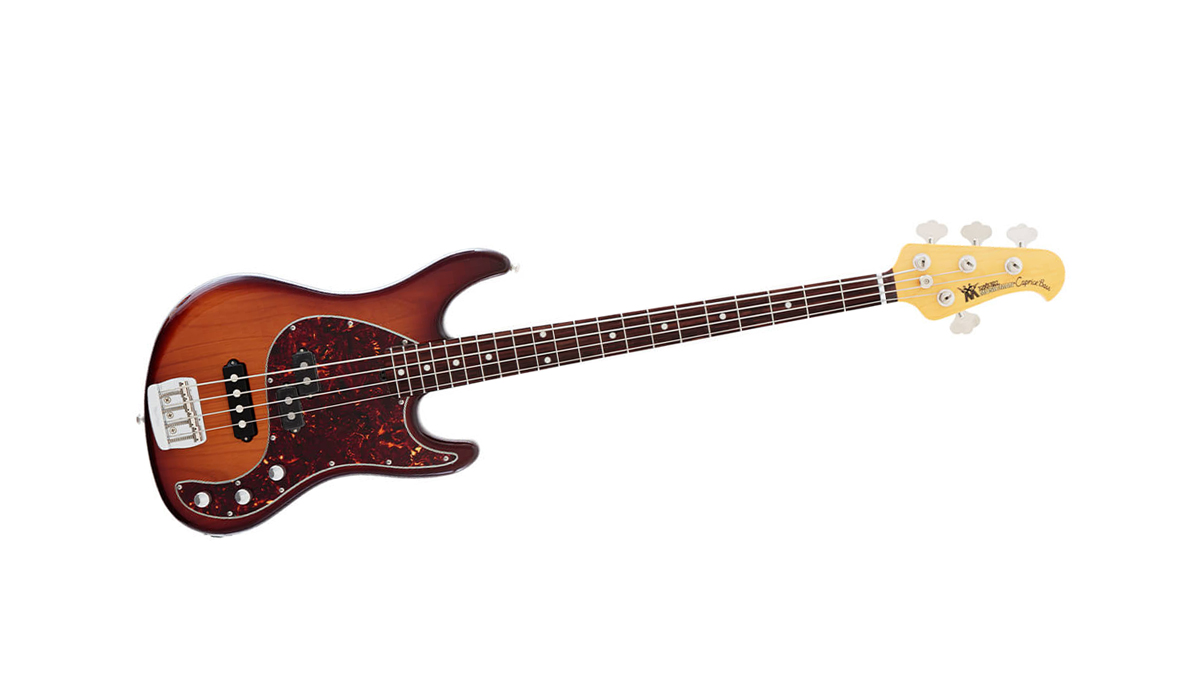MusicRadar Verdict
A sound addition to the Ernie Ball catalogue. Check it out!
Pros
- +
A pedigree bass that delivers on all fronts: a classy looking instrument with a strong passive sound.
Cons
- -
The price tag.
MusicRadar's got your back
We looked at Ernie Ball’s passive Cutlass bass a short while back and were suitably impressed, so here for your delectation is the twin pickup-equipped Caprice.
Being passive, naturally the tones on offer are quite different from the perennial active favourites from the Music Man stable; but, if the general level of quality exhibited by the Cutlass model was anything to go by, the Caprice should prove to be equally enticing.
Build
The offset body shape is curvaceous, with plenty of contouring at front and back, and is particularly comfortable to wear. Both cutaways offer excellent access to the upper frets of the 21-fret neck, while the Tobacco Burst finish stands out underneath the thick polyester gloss finish - although being alder, there is limited grain visibility.
The three-ply tortoiseshell scratchplate finishes off the perfect visual combination. The whole instrument looks sleek, with clean lines, a simple design and enough familiar touches to mark it as a Music Man, but with notable differences from the existing models that we know and love.
The maple neck has a satin polyurethane finish, which gives it a nicely slippery feel. It’s very comfortable in terms of profile, nut width, string spacing and ease of navigation. The nut width is slightly less than that of the Cutlass, and the rounded profile harks back to the dimensions of the Sterling neck, which is no bad thing.
The finishing is of the high level we have come to expect of an Ernie Ball instrument, with no sharp fret ends and a comfortable action.
The bass is also slightly lighter than the Cutlass, so if you’re looking for an instrument that won’t take its toll on your back, this model will be worth investigating. It also balances well, even with its oversized headstock.
All said, the finishing is of the high level we have come to expect of an Ernie Ball instrument, with no sharp fret ends and a comfortable action. White position markers have been used on the front and side of the neck, while the truss rod is adjusted via the now obligatory adjustment wheel at the base of the neck.
The hardware is also of the quality we have come to expect: the machine heads feel solid and turn smoothly, while the passive volume/volume/tone controls operate comfortably. The top-loading bridge is the usual simple affair from Ernie Ball. The pickups are both humbuckers, despite their split and single-coil appearance. We should expect to hear some differences in their respective tones, so let’s plug it in...
Sounds
Although the Caprice doesn’t have the sonic sledgehammer of, say, the Stingray or Sterling, what it does have is a vibrant passive tone that bubbles along very nicely. Don’t be fooled into thinking the pickups won’t be up to much due to the lack of an active circuit: these units cover all the necessary ground.
We were highly impressed with the tones delivered with both pickups on full. If you want warmth with passive clarity, strength and depth of tone, and an even note volume across all four strings, you may be looking at your next bass.
There is a lot to like about this bass. Ernie Ball should be commended for delivering a passive instrument that ticks so many boxes.
Soloing each pickup, the neck unit instantly delivers the expected single split-coil sound. As a humbucking unit, electrical buzzing is limited, and the pickup puts on a strong tonal display. Turning the control fully counter-clockwise produces a hefty thump, particularly good for Motown-style muted playing: opening up the tone control is ideal for pick players requiring definition and attack, or fingerstyle players who require some rasp and clarity to their tone.
The bridge unit is similarly flexible, and although it can’t sound like a regular EB humbucking pickup, it provides the necessary twang and a brighter delivery that complements the neck pickup very well. Used on its own, it sounds a little thin: winding in the tone control a little improves matters. Where it really shines is in conjunction with the neck pickup. This achieves the full spread of tonal capabilities on offer, although how you set the volume level for each pickup is entirely down to your personal preference.
There is a lot to like about this bass. Ernie Ball should be commended for delivering a passive instrument that ticks so many boxes. Our only concern is the price tag, which seems high despite the brand’s pedigree. Brexit has had a noticeable effect on the pricing of instruments from the US, and as a result, the Caprice could find itself edged off many players’ shopping lists. That aside, in terms of looks, playability, sounds and comfort, the Caprice is certainly worth some further investigation.
“A synthesizer that is both easy to use and fun to play whilst maintaining a decent degree of programming depth and flexibility”: PWM Mantis review
“I feel like that song had everything we needed to come back with”: Bring Me The Horizon’s Lee Malia on Shadow Moses, its riff and the secrets behind its tone, and why it was the right anthem at the right time
“I said, ‘Are we sure we can write a song about death?’”: The story of Mike + The Mechanics' classic No.1 The Living Years










